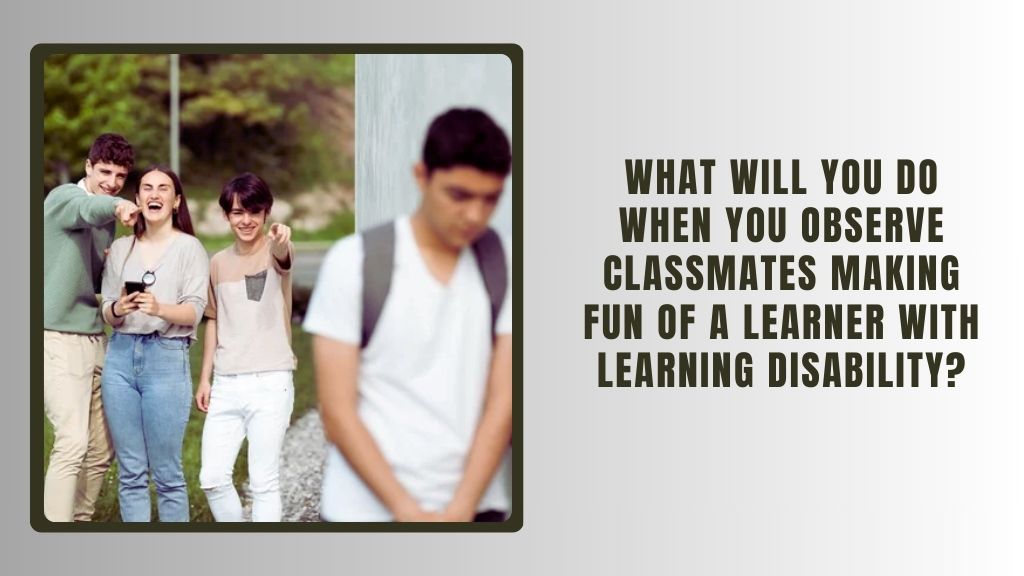What will you do when you observe classmates making fun of a learner with a learning disability? This is an important question because every student deserves to be treated with respect and kindness. Unfortunately, some learners with learning disabilities face bullying and mockery from their classmates, which can deeply affect their confidence and academic performance. As responsible individuals, it is crucial to take a stand against such behavior and create an inclusive and supportive environment.
In this blog, we will discuss the right actions to take when witnessing such situations, the importance of empathy, and how to promote awareness about learning disabilities to ensure a respectful and friendly learning atmosphere for all.
Understanding Learning Disabilities
What Are Learning Disabilities?
Learning disabilities are neurological conditions that affect a person’s ability to read, write, understand information, or solve problems. They do not indicate a lack of intelligence but rather differences in how the brain processes information.
Also read: Discuss Two Ways in Which Being Employed Could Contribute to the Improvement of Emotional Well Being
Common Types of Learning Disabilities
- Dyslexia: Difficulty in reading and recognizing words.
- Dysgraphia: Trouble with writing and handwriting.
- Dyscalculia: Challenges in understanding numbers and mathematical concepts.
- ADHD (Attention Deficit Hyperactivity Disorder): Difficulty in maintaining attention and controlling impulses.
- Auditory and Visual Processing Disorders: Trouble in processing sounds or visual information.
Understanding these disabilities helps us become more compassionate toward those who struggle with them.
What Will You Do When You Observe Classmates Making Fun of a Learner with Learning Disability?
Lack of Awareness
Many students do not understand learning disabilities and may wrongly assume that their classmate is not trying hard enough or is not smart.
Peer Pressure
Some students mock others to gain attention or fit into a social group.
Misconceptions and Stereotypes
There are many myths about learning disabilities. Some believe that learners with disabilities are not capable, which is entirely false.
Influence of Media and Society
Negative portrayals of people with disabilities in media may reinforce discrimination and bullying.
Steps to Take When You Observe Bullying Against a Learner with a Learning Disability
1. Intervene Immediately but Calmly
- Approach the situation and firmly ask the classmates to stop.
- Use a polite but strong tone to let them know that making fun of someone is unacceptable.
- Stay calm and composed to prevent escalation.
Example:
If you see a group of students laughing at a classmate’s reading difficulties, say, “That’s not funny. Everyone learns differently, and mocking them is not okay.”
2. Support the Learner Being Targeted
- Offer kind words to the learner who is being bullied.
- Let them know they are not alone and that you support them.
- Encourage them to ignore the bullies and focus on their strengths.
Example:
Tell the student, “You are doing great. Don’t listen to them. Keep learning at your own pace.”
3. Report the Incident to a Teacher or Authority
- Inform a teacher, school counselor, or any responsible adult about the incident.
- Schools have anti-bullying policies and can take action to stop such behavior.
Example:
If bullying happens regularly, you can tell a teacher, “I noticed some students making fun of a classmate’s reading challenges. Can we do something to educate them about learning disabilities?”
4. Educate and Raise Awareness
- Talk to classmates about learning disabilities and why mocking someone is harmful.
- Organize awareness programs or discussions about disabilities.
- Encourage inclusion and kindness in the classroom.
Example:
You can say, “Did you know that some of the most successful people, like Albert Einstein and Thomas Edison, had learning difficulties? Mocking someone doesn’t help anyone.”
5. Promote a Culture of Kindness and Respect
- Encourage classmates to be supportive rather than critical.
- Set an example by treating everyone with respect.
- Praise classmates for acts of kindness to reinforce positive behavior.
Example:
If you see someone helping a struggling learner, acknowledge it by saying, “That’s really kind of you to help. We should all do the same.”
The Importance of Standing Up Against Bullying
1. Creates a Safe Learning Environment
When students stand against bullying, it fosters a positive and safe atmosphere in schools.
2. Builds Empathy and Understanding
Intervening in such situations helps everyone become more empathetic and aware of different learning challenges.
3. Encourages Confidence in Learners with Disabilities
When bullied students receive support, they feel more confident and motivated to learn.
4. Sets a Positive Example for Others
Standing up against bullying encourages others to do the same and promotes respect and acceptance.
Long-Term Ways to Support Learners with Learning Disabilities
1. Encourage Inclusive Education
- Schools should implement teaching methods that accommodate different learning styles.
- Teachers should receive training on how to support students with disabilities.
2. Form Peer Support Groups
- Creating student-led support groups can help learners with disabilities feel included.
- Classmates can assist each other with studies in a supportive way.
3. Advocate for Policy Changes in Schools
- Schools should have strict anti-bullying policies.
- Awareness programs should be included in the curriculum.
4. Use Positive Language
- Avoid using negative or demeaning words when talking about disabilities.
- Promote respectful discussions about different learning styles.
5. Teach Conflict Resolution Skills
- Schools should teach students how to handle conflicts in a peaceful and respectful manner.
- Encouraging open discussions about bullying can help prevent it.
Key Takeaways
- Observing classmates making fun of a learner with a learning disability is a serious issue that needs intervention.
- It is important to speak up against bullying in a calm and firm manner.
- Supporting the affected student and reporting the incident can make a big difference.
- Educating others about learning disabilities fosters a more inclusive environment.
- Long-term efforts like awareness programs and inclusive education policies can create a lasting impact.
Also read: Simple and Impactful Mlk Service Project Ideas
Conclusion
What will you do when you observe classmates making fun of a learner with a learning disability? The best response is to stand up against the bullying, support the student being targeted, and educate others about the importance of respect and inclusion. Creating a supportive learning environment benefits everyone and ensures that all students, regardless of their learning abilities, have the opportunity to succeed. Small actions like speaking up, showing kindness, and spreading awareness can lead to a more compassionate and understanding society.

